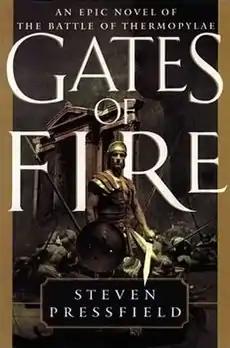Gates of Fire
Gates of Fire is a 1998 historical fiction novel by Steven Pressfield that recounts the Battle of Thermopylae through Xeones, a perioikos[1] (free but non-citizen inhabitant of Sparta) born in Astakos,[2] and one of only three Greek survivors of the battle.
 First edition | |
| Author | Steven Pressfield |
|---|---|
| Country | Australia |
| Language | English |
| Genre | Historical fiction |
| Publisher | Doubleday |
Publication date | October 20, 1998 |
| Media type | Print (hardback) |
| Pages | 400 |
| ISBN | 978-0-385-49251-5 |
| OCLC | 38916930 |
| 813/.54 21 | |
| LC Class | PS3566.R3944 G38 1998 |
Gates of Fire was on the Commandant of the Marine Corps' Reading list. It is taught at West Point, the United States Naval Academy, and at the Marine Corps The Basic School. The novel stresses the literary themes of fate and irony as well as the military themes of honor, duty, stoicism, and esprit de corps. [3]
Plot summary
The novel is narrated by Xeones, a perioikos and one of only three Greek survivors of the Battle of Thermopylae. His story is dictated to King Xerxes and transcribed by his court historian, Gobartes.
At Thermopylae, the allied Greek nations deployed a small force of four thousand Greek heavy infantry against the invading Persian army of two million strong. Leading the Greeks was a small force of three hundred Spartans, chosen because they were all "sires" — men who had to have sons who could preserve their blood line, should they fall in battle.[4]
Thermopylae was the only gateway into Greece for the Persian army, and presented the perfect choke point — a narrow pass bordered by a huge mountain wall on one side and a cliff drop-off to the sea on the other. This area decreased the Persians' advantage of having large numbers. Delaying the Persian advance here would give the Greek allies enough time to ready a larger, main force to defend against the Persians. The battle takes place simultaneously with the sea battle at Artemisium, where the Allied Greek forces hoped to protect the flank of the army at Thermopylae whilst not being cut off themselves. The Greeks were at a disadvantage at Artemisium, as at Thermopylae - the Persians outnumbered the Allies, and most of the Athenian ships were newly built and crewed by inexperienced sailors - and both sides suffered heavy losses in the sea battle.[4]
The novel is told from either the perspective of the royal scribe to the Persian king Xerxes, as he records the story of Xeones, after the battle, or in the first person from Xeones' point of view. Though Xeones is critically wounded in the battle, the Persian King Xerxes orders his surgeons to make every effort to keep the captive squire alive. Much of the narrative explores Spartan society, particularly the agoge, which is the military training program which all young Spartan boys must complete to become citizens of Sparta. The novel also details the heroics of several dozen Spartans, including the King of Sparta, Leonidas,[5] the Spartan Captain Polynikes, a young Spartan warrior named Alexandros, and the Spartan officer Dienekes. Pressfield employs detailed descriptions of the Spartan phalanx in battle, as well as the superior training and discipline of the Spartan warriors.[4]
Reception
Kirkus Reviews called it "A triumph in historical fiction".[6]
Canceled film adaptation
Shortly after the release of the novel, George Clooney's production company, Maysville Pictures, acquired the rights for a film. David Self was brought on to write the screenplay, and Michael Mann was set to direct. The film suffered a troubled production, and Mann departed the project citing creative differences. It was later put on hold due to lukewarm critical reception for historical fiction films such as Troy, Alexander and King Arthur, all released in 2004. After the release and success of 300 (2006), a film also based on the Battle of Thermopylae, plans for the Gates of Fire adaptation were completely scrapped.[7]
References
- "Gates of Fire". New York Times. 1998. Retrieved 18 August 2016.
I was recognized at least ironically as a freeborn and, evincing such qualities of a wild beast as the Lakedaemonians found admirable, was elevated to the status of parastates pais, a sort of sparring partner for the youths enrolled in the agoge, the notorious and pitiless thirteen-year training regimen which turned boys into Spartan warriors.
- "Gates of Fire". New York Times. 1998. Retrieved 18 August 2016.
My childhood home, before fate set me upon the road which found its end at the Hot Gates, was originally in Astakos in Akarnania, north of the Peloponnese, where the mountains look west over the sea toward Kephallinia and, beyond the horizon, to Sikelia and Italia.
- Kelly, John D.; Jauregui, Beatrice; Mitchell, Sean T.; Jeremy Walton (2010). Anthropology and Global Counterinsurgency. Chicago, Illinois: University of Chicago Press. p. 351. ISBN 978-0-226-42995-3.
- Rennison, Nick (21 September 2009). 100 Must-read Historical Novels. A&C Black. pp. 116–117. ISBN 978-1-4081-1396-7.
- Finkel, Gal Perl (April 8, 2017). "Wars are won by preparation and not by courage alone". The Jerusalem Post. Retrieved 6 February 2019.
- "Gates of Fire". Kirkus Reviews. Retrieved 6 February 2019.
- "Best Films Never Made #11: Michael Mann's Gates of Fire". 23 February 2014.